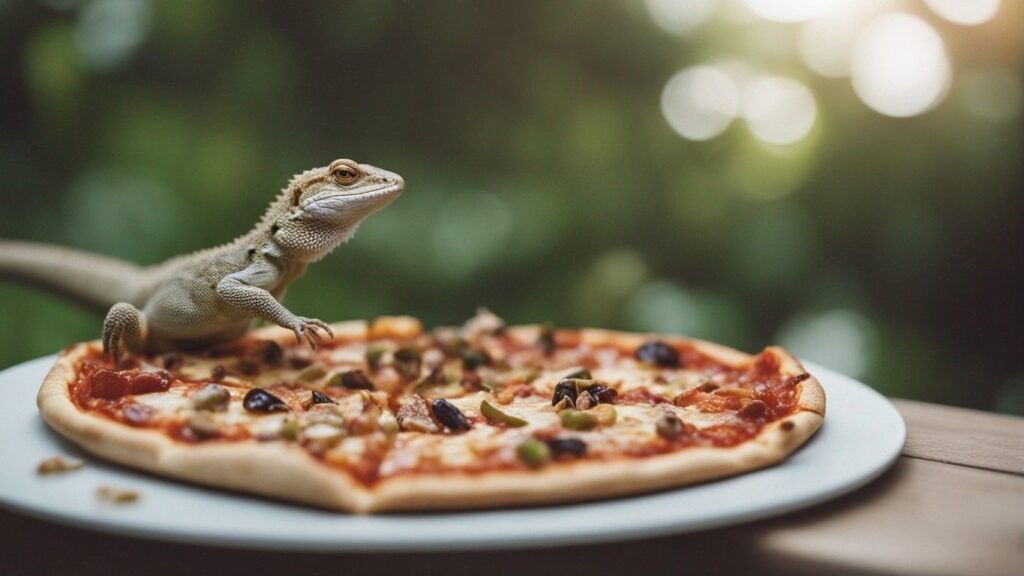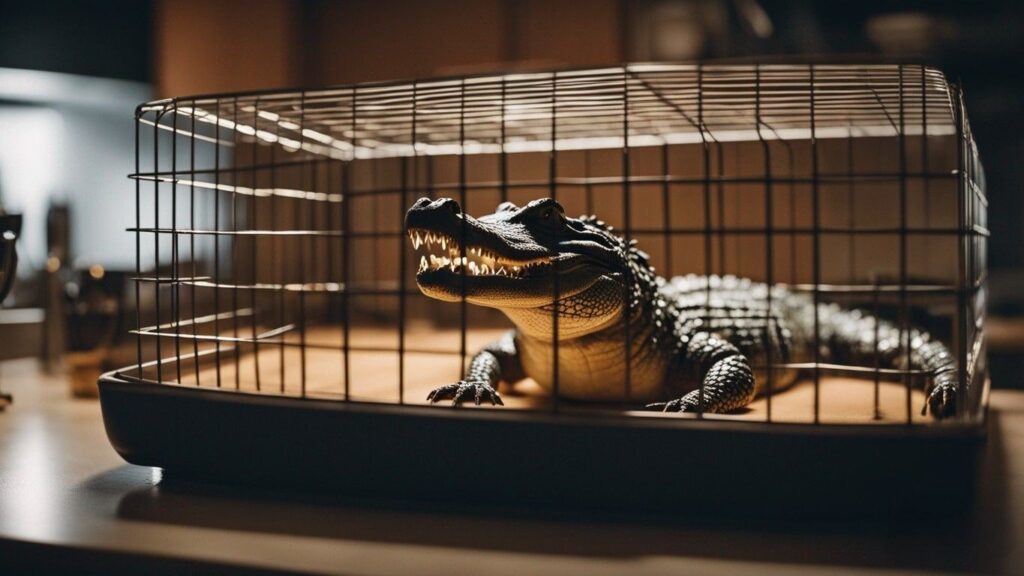
When it comes to feeding our beloved turtles, it’s essential to understand their dietary needs and provide them with the proper nutrition.
One common question that arises is whether turtles can eat cat food. Let’s explore this topic and learn about safe feeding tips for our reptilian friends.
Turtles should not eat cat food as it is not recommended for their dietary needs. Cat food does not provide the specific nutritional requirements that turtles require and can lead to issues such as obesity or improper shell development.
Key Takeaways:
- Turtles have diverse dietary needs based on their species, and cat food is not recommended as a staple in their diet.
- Feeding turtles a varied diet that includes commercial turtle pellets, live food, and vegetables is essential for their health and longevity.
- Cat food may not meet the specific nutritional requirements of turtles and can lead to issues such as obesity or improper shell development.
- Consulting a veterinarian is crucial to determine the specific dietary needs of your turtle and ensure their well-being.
- Providing a balanced and varied diet, following a proper feeding schedule, and removing uneaten food from the water are important for your turtle’s optimal health.
Understanding Turtle Nutrition
Turtles have unique nutritional requirements that are influenced by factors such as their species and environmental temperature.
To ensure the health and well-being of your turtle, it’s important to understand their dietary needs.
Estimations of a turtle’s standard metabolic rate at different temperatures have been conducted to determine their energy requirements.
This information helps us understand how much food a turtle needs to maintain its energy levels and overall health.
The metabolic rate of a turtle can vary based on factors such as species, age, and environmental conditions.
Protein is an essential component of a turtle’s diet, especially for growing turtles. The amount of protein required varies depending on the species and age of the turtle.
Juvenile turtles typically require higher protein levels to support their growth and development.
On the other hand, adult turtles should have a lower percentage of fat in their diet to prevent obesity and shell issues.
It is recommended to consult a veterinarian for specific nutritional guidelines based on your turtle’s needs.
A veterinarian can provide valuable insights into the protein and fat requirements for your turtle’s specific species and age.
They can also offer advice on achieving a balanced diet that meets all the necessary dietary requirements.
By understanding turtle nutrition and providing a diet tailored to their specific needs, you can help your turtle thrive and live a healthy life.
Why Cat Food is Not Ideal for Turtles
Feeding turtles cat food may seem like a convenient option, but it is not the ideal choice for their nutritional needs.
While most of the ingredients in cat food are not toxic to turtles, the recipe and nutritional content are not suitable for their specific dietary requirements.
Cat food is formulated for felines, which have different nutritional needs compared to turtles.
Turtles require a balanced diet that includes specific proportions of protein, fat, and essential nutrients to support their growth and overall health.
Unfortunately, cat food tends to have excessive protein and fat content, which can lead to health issues such as obesity and improper shell development.
Furthermore, turtles may not recognize cat food as something edible, especially if they are used to consuming live prey or specific types of pellets.
Unlike turtles, cats are carnivores and rely primarily on a meat-based diet. Feeding turtles cat food may not provide the variety and nutrients they need, potentially leading to nutritional deficiencies and health problems in the long run.
To provide turtles with the proper nutrition they require, it is best to offer them a balanced diet that consists of commercially available turtle pellets, live food such as insects or small fish, and a variety of vegetables.
These options cater to their specific dietary needs and ensure they receive adequate levels of proteins, fats, vitamins, and minerals necessary for their well-being and longevity.
The Best Diet for Turtles
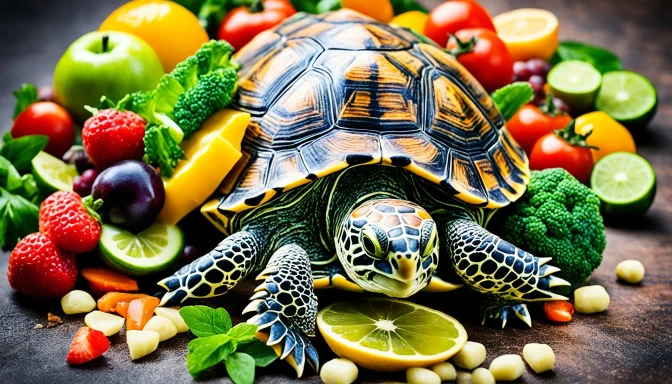
When it comes to the optimal diet for turtles, replicating their wild diet is key. This involves providing a combination of commercially available turtle pellets, live food, vegetables, and essential supplements.
To ensure turtles receive the necessary nutrients, commercially available turtle pellets are an excellent choice.
These pellets are specially formulated to meet the dietary requirements of turtles and provide a convenient and balanced source of nutrition.
In addition to turtle pellets, live food such as crickets, mealworms, or earthworms should be included in their diet.
These live foods not only provide essential protein but also stimulate their natural hunting instincts, promoting mental and physical stimulation.
Vegetables play a vital role in a turtle’s diet as they provide essential vitamins, minerals, and fiber.
Dark, leafy greens such as kale and collard greens should be incorporated, along with other vegetables like squash and watercress.
To ensure turtles receive the necessary vitamins and minerals, vitamin and calcium supplements should be provided.
These supplements help meet their specific nutritional requirements and support overall health and shell development.
Remember, each turtle may have slightly different dietary needs, so consulting a veterinarian is essential to determine the optimal diet for your turtle.
They can provide tailored advice based on your turtle’s species, age, and individual requirements.
The Benefits of Replicating the Wild Diet
By providing a diet that replicates their natural habitat, turtles can thrive in captivity.
The replication of their wild diet ensures they receive the same essential nutrients found in their natural environment and promotes their overall well-being.
Offering a variety of food options, including commercially available turtle pellets, live food, and a range of vegetables, allows turtles to experience a diverse and balanced diet.
This helps prevent nutritional deficiencies and ensures they receive all the necessary vitamins, minerals, and nutrients for optimal health.
Including live food in their diet not only fulfills their protein needs but also stimulates natural behaviors and encourages physical activity.
Additionally, incorporating a variety of vegetables provides turtles with essential fiber, aiding digestion and promoting gut health.
Supplements such as vitamin and calcium supplements are crucial for turtles as they may not receive these nutrients in adequate amounts from their diet alone.
These supplements help support healthy shell development, strong bones, and overall immune function.
Remember to consult a veterinarian to determine the specific dietary requirements for your turtle and provide a diet that closely resembles their natural habitat.
By doing so, you can ensure that your turtle lives a long and healthy life.
Recommended Foods for Turtles
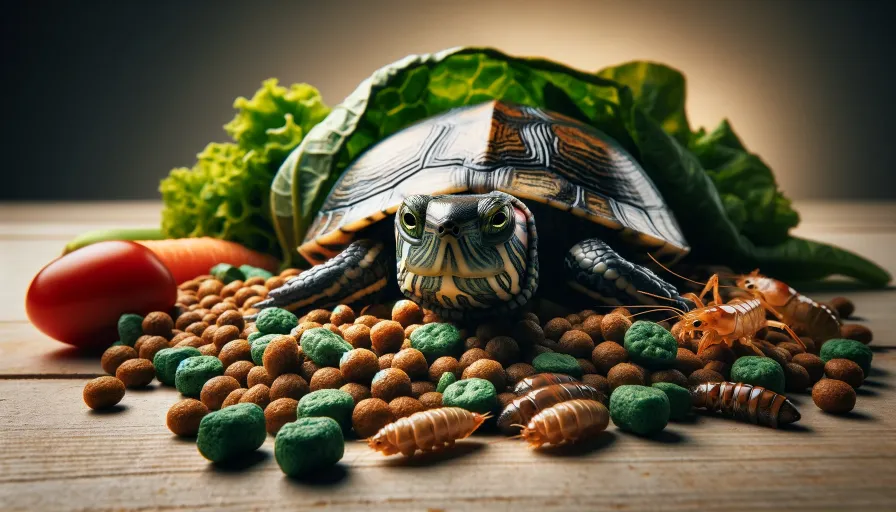
When it comes to feeding turtles, a well-rounded diet is essential for their overall health and well-being. Below are some recommended foods that you can incorporate into your turtle’s diet:
1. Commercially Available Turtle Pellets
Commercial turtle pellets should form the foundation of your turtle’s diet. These specially formulated pellets provide a balanced mix of nutrients to meet their dietary requirements.
Look for high-quality brands that offer a variety of pellet sizes suitable for different turtle species.
2. Live Prey for Turtles
Live prey can be an excellent source of protein for turtles. Feeder fish, such as guppies or goldfish, and insects like crickets or mealworms, can be fed to your turtle occasionally.
These live prey items simulate the hunting experience and provide enrichment for your turtle.
3. Turtle Treats
Turtle treats should be given sparingly as a special reward or for variety in their diet. You can find commercially available aquatic turtle treats specifically designed for turtles.
Alternatively, you can offer small portions of dog or cat kibble as an occasional treat.
Additionally, turtles enjoy fruits such as banana, melon, apples, and berries, but remember to limit their fruit intake due to the sugar content.
4. Vegetables for Turtles
Vegetables play a critical role in a turtle’s diet, providing them with essential vitamins, minerals, and fiber.
Dark, leafy greens like collard greens and kale are highly nutritious options. Other vegetables such as squash and watercress are also great choices.
Ensure a varied selection of vegetables to provide a well-rounded nutritional intake for your turtle.
Remember to consult with a veterinarian to determine the appropriate portion sizes and frequency of feeding for your specific turtle species.
A balanced diet consisting of commercially available turtle pellets, live prey, and a variety of fruits and vegetables will help keep your turtle healthy and happy.
What Turtles Should Avoid Eating
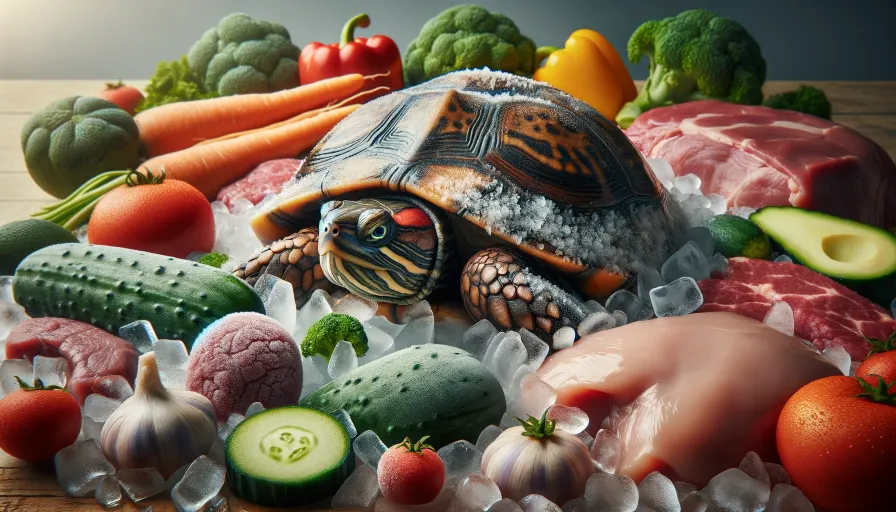
When it comes to feeding turtles, it’s important to be aware of the foods they should avoid.
While turtles have diverse dietary needs, there are certain foods that may not be suitable for their health and well-being. Here are some foods that turtles should steer clear of:
Frozen Vegetables
Frozen vegetables should only be used occasionally in a turtle’s diet. Although they may seem convenient, frozen vegetables lack essential vitamins that turtles require for optimal health.
Frozen or Freeze-Dried Fish
Frozen or freeze-dried fish may not provide the necessary nutritional value for turtles. These types of fish can be deficient in vital nutrients, so it’s best to avoid feeding them to your turtle.
Insects from the Yard
While turtles are known to eat insects, it’s essential to avoid feeding them insects from the yard. Insects collected from outdoor environments can introduce harmful bacteria, pesticides, or parasites to turtles, posing potential health risks.
Dog or Cat Food
Although dog or cat food may be tempting to offer as a treat, it should not be the main staple in a turtle’s diet.
Dog and cat food are formulated specifically for the dietary needs of those pets, not turtles. Therefore, it’s best to limit their consumption of dog or cat food.
Raw Chicken or Beef
Turtles should not be given raw chicken or beef. Raw meats carry the risk of foodborne diseases and can be harmful to a turtle’s health.
It is important to ensure that any meat fed to turtles is properly cooked and free from seasonings and additives.
Toxic Plants
Turtles should not consume toxic plants or fake plants that could be accidentally ingested. Some plants can be toxic to turtles and may cause serious health issues.
It’s crucial to thoroughly research and verify the safety of plants before introducing them into a turtle’s habitat.
By being mindful of these foods to avoid, you can ensure that your turtle has a safe and nutritious diet.
Remember, consulting a veterinarian is always a wise decision to determine the best feeding practices for your specific turtle.
Proper Feeding Schedule for Turtles
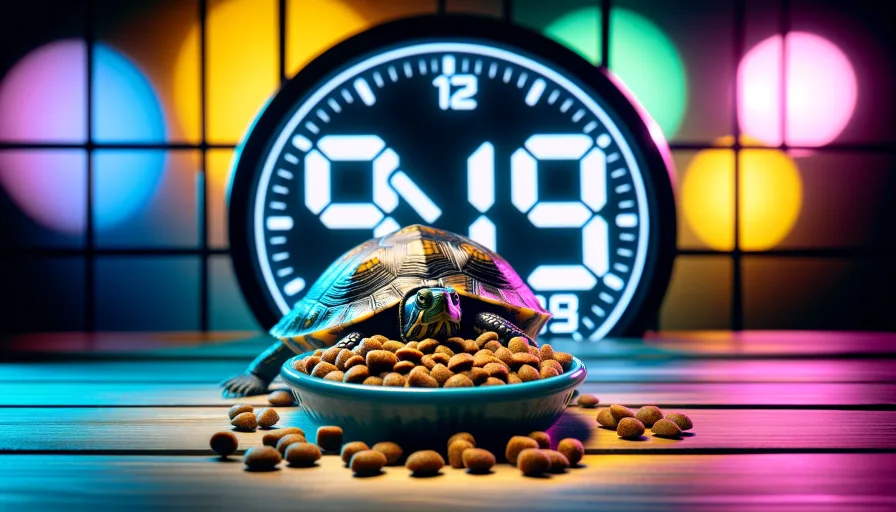
Feeding turtles requires a consistent schedule to ensure their optimal health and well-being. The feeding frequency for turtles depends on their age and species.
For adult turtles, it is recommended to offer food every two to three days. This allows them time to digest their food properly and prevents overfeeding, which can lead to obesity and other health issues.
Juvenile turtles, on the other hand, have higher energy requirements and may need to be fed daily.
Their growing bodies require more nutrients and protein to support their development.
By providing daily feedings, you can ensure that their nutritional needs are met during this crucial stage of growth.
When feeding your turtles, it is important to remove any uneaten food from the water. Leaving food in the tank can lead to water contamination and affect the water quality.
Uneaten food can break down and release harmful substances that may harm your turtles and other aquatic creatures in the tank.
Regularly monitoring and maintaining clean water conditions is essential for the health and well-being of your turtles.
To maintain a balanced and varied diet for your turtles, it is recommended to follow a feeding schedule that includes a mixture of commercially available turtle pellets, live prey, and vegetables.
Commercial turtle pellets provide essential nutrients and can serve as the primary source of nutrition.
Live prey such as crickets, mealworms, or earthworms offer additional protein and help satisfy their natural hunting instincts.
Adding a variety of vegetables to your turtle’s diet ensures they receive the necessary vitamins, minerals, and fiber.
Dark, leafy greens like kale, collard greens, and dandelion greens are excellent choices. Other vegetables like squash and bell peppers can also be included to offer a diverse range of nutrients.
Remember to consult a veterinarian for specific dietary guidelines based on the species and individual needs of your turtles.
They can provide expert advice on the ideal feeding schedule and help tailor a nutrition plan that meets the unique requirements of your turtles.
Conclusion
In conclusion, it is important to avoid feeding cat food to turtles as it may not provide the necessary nutrients for their specific dietary needs.
Turtles require a balanced and varied diet to thrive, which includes commercially available turtle pellets, live prey, and vegetables.
Providing these foods ensures that turtles receive the essential proteins, vitamins, and minerals they need for optimal health and growth.
Consulting a veterinarian is crucial when determining the best diet for your turtle. They can provide personalized guidance based on your turtle’s species, age, and overall health.
A veterinarian can also recommend the appropriate feeding schedule and any necessary vitamin or calcium supplements.
By seeking professional advice, you can ensure that your turtle receives the proper nutrition it needs to live a long and healthy life.
Remember, a balanced diet is essential for turtles. While cat food may be tempting due to its convenience, it does not meet the specific nutritional requirements of turtles.
It is always best to prioritize their health and well-being by feeding them a diet that is tailored to their needs.
So, consult with a veterinarian, provide a variety of suitable foods, and watch your turtle flourish with the right diet!
Frequently Asked Questions
Q: What should you not feed turtles?
A: You should not feed turtles dairy products, processed foods, bread, or any food high in sugar and fat. Also, avoid feeding them toxic plants like rhubarb, potato leaves, and tobacco leaves.
Q: What food is safe for turtles?
A: Safe foods for turtles include fresh vegetables (like carrots, squash, and leafy greens), fruits (in moderation), and protein sources like insects, worms, and cooked fish or chicken. The diet depends on the species of turtle.
Q: Can a tortoise eat dry cat food?
A: Dry cat food is not recommended for tortoises as it does not meet their nutritional needs and can lead to health problems. Tortoises require a diet high in fiber and calcium, with specific nutrients found in plants and vegetables.
Q: What can you feed wild turtles?
A: If feeding wild turtles, offer natural foods like leafy greens, aquatic plants, insects, and non-citrus fruits. Avoid bread, processed foods, or any unnatural items to their diet.
Q: What is a tortoise’s favorite food?
A: A tortoise’s favorite food can vary, but they generally enjoy leafy greens like kale, dandelion greens, and hibiscus leaves, as well as vegetables like carrots and squash. Variety is important for their health.
Q: What can a tortoise eat list?
A: A tortoise can eat a variety of foods including leafy greens (like kale, collard greens, and mustard greens), vegetables (like bell peppers, carrots, and squash), edible flowers, and some fruits (like apples and berries). They also need a source of calcium, which can be provided through cuttlebone or calcium supplements.


